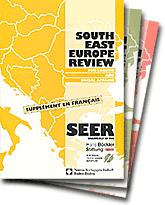Balkan trade unionism and the implications of information and communication technology for the time-space dynamics of collective mobilisation
Balkan trade unionism and the implications of information and communication technology for the time-space dynamics of collective mobilisation
Author(s): Andreja Živković, John HoganSubject(s): Politics / Political Sciences
Published by: Nomos Verlag
Summary/Abstract: This paper examines the significance of information and communications technology (ICT) for the construction of Balkan post-communist trade unionism. Its findings are grounded in a research project into the use of ICT by Balkan trade union activists and officials based on interviews1 elaborated through the medium of a content analysis of the South-East European Labour Educators Network (SEELEN) website and focused on the case of ex-Yugoslavia. The example of the Balkans is arguably paradigmatic of the challenges facing labour in the era of globalisation: neo-liberal restructuring; the eclipse of the nationstate in the face of multinational capital; the reassertion of empire; and the unleashing of warring collective identities (Zivković, 1999; Zivković, 2004). This paper examines the significance of ICT for this bonfire of territorial structures, economic regimes and collective identities. Drawing upon the heuristic of ‘distributed discourse’ established in extant research on the implications of ICT for the politics and processes of trade unionism (Hogan and Grieco, 2000; Hogan and Greene, 2002; Greene, Hogan and Grieco, 2003), this article explores the potentiality of distributed forms of communication for trade union democratisation and for the construction of an alternative model of globalisation – ‘alter-globalisation’ – based on a politics of meta-governance (Grieco, 2003).
Journal: SEER - South-East Europe Review for Labour and Social Affairs
- Issue Year: 2006
- Issue No: 04
- Page Range: 65-81
- Page Count: 17
- Language: English

